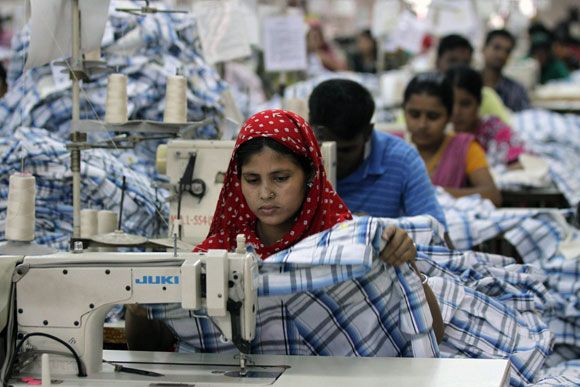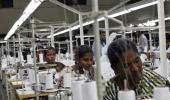Some workers in India were also make to work on Sundays and national holidays "in sweltering heat, without adequate supply of clean drinking water or any breaks".
 Workers in countries like India and Bangladesh employed in supplier factories for global retail giants Walmart, Gap and H&M face "intensive labour exploitation and abuse" including non-payment of wages, sexual harassment and unsafe work environments, according to advocacy groups.
Workers in countries like India and Bangladesh employed in supplier factories for global retail giants Walmart, Gap and H&M face "intensive labour exploitation and abuse" including non-payment of wages, sexual harassment and unsafe work environments, according to advocacy groups.
The Asia Floor Wage Alliance, which released a series of reports by trade unions and advocacy groups on the working conditions across the companies' supplier factories for Walmart, H&M and Gap in India, Bangladesh, Indonesia and Cambodia, includes over 70 organisations representing garment industry trade unions, NGOs, consumer groups and research institutes.
The report 'Precarious Work in the Walmart Global Value Chain' said that across the 24 Walmart producing factories surveyed in India, workers reported violations of international labour standards including a "range of wage practices, including payment of wages below their skill level, denial of legally stipulated over time rates, illegal deductions, late payments and non-payment of wages".
Some workers in India were also make to work on Sundays and national holidays "in sweltering heat, without adequate supply of clean drinking water or any breaks".
Information for the report was collected through interviews and focus group discussions with 344 workers engaged in Walmart supply chains in Bangladesh, Cambodia and India; and a case study, spanning 8 months, of working conditions in an Indonesian Walmart supplier employing 3,800 Indonesian contract workers.
In India, field research included interviews with 105 workers producing garments in Walmart supplier factories across three garment manufacturing regions in Gujarat, Tamil Nadu and Uttar Pradesh.
The report said that workers in Walmart supplier factories face a "range of coercive practices that make them particularly vulnerable to forced labour", including "threats of termination levied against temporary and contract workers for refusing to work overtime hours or for exercising their right to freedom of association".
In all four countries, contingent workers are required to work excessive hours with the threat of losing their jobs if they refuse.
The report said use of contract labour is most pervasive in Delhi-NCR with an estimated 60-80 per cent of the garment workforce employed as contract workers.
Casual and contract workers lack job security, social security benefits and freedom of association, it said.
"This facilitates the sidestepping of statutory obligations by employers and creates a constant state of insecurity for workers," it said.
The report further added that health consequences faced by workers in India's garment industry include respiratory illnesses including silicosis from sand blasting, tuberculosis, ergonomic issues such as back pain, reproductive health issues and mental health problems including depression and anxiety.
"While major accidents are not common, minor incidents such as puncture wounds from needles are a daily occurrence.
Other hazards include extended exposure to heat, noise, dust and chemicals; and biological vulnerability due to poor nutrition," it said.
Women garment workers routinely face violence in the workplace, including sexual harassment and physical and sexual violence, the reports said.
Among the Walmart supplier factories in India investigated for the study, sexual harassment from supervisors is "widespread" and women do not report enduring sexual harassment because complaints most often lead to termination.
Maternity benefits are also granted inconsistently - ranging from none at all to well below statutory requirements.
In the Gap factories investigated for the study, workers reported they are forced to do overtime and that they cannot refuse it.
"Reported penalties for refusing overtime include dismissal from work and physical and verbal abuse," it said.
Most Cambodians in Walmart supplier factories work under "highly exploitative" contracts that "leave them susceptible to unsafe working conditions, low wages, denial of benefits and harsh penalties for engaging in union activity -- including termination of employment", it added.
This includes "forced overtime" during Cambodia's hottest season, leading to "mass fainting episodes resulting from over exertion, exacerbated by inadequate nutrition".
The report cited the April 2013 Rana Plaza tragedy in Bangladesh, when 1,139 workers were killed in the collapse of the eight-storey commercial building.
Following the devastating collapse, 200 brands signed the 2013 a legally binding Accord on Fire and Building Safety in Bangladesh but Walmart refused. The report said that instead of signing the Accord, Walmart, together with Gap, founded the Alliance for Bangladesh Worker Safety.
The Alliance for Bangladesh Worker Safety is a voluntary measure rather than a contractual commitment but to date, Walmart has refused to make a contractual commitment to ensuring safe working conditions for Bangladeshi workers.
Photograph: Reuters










